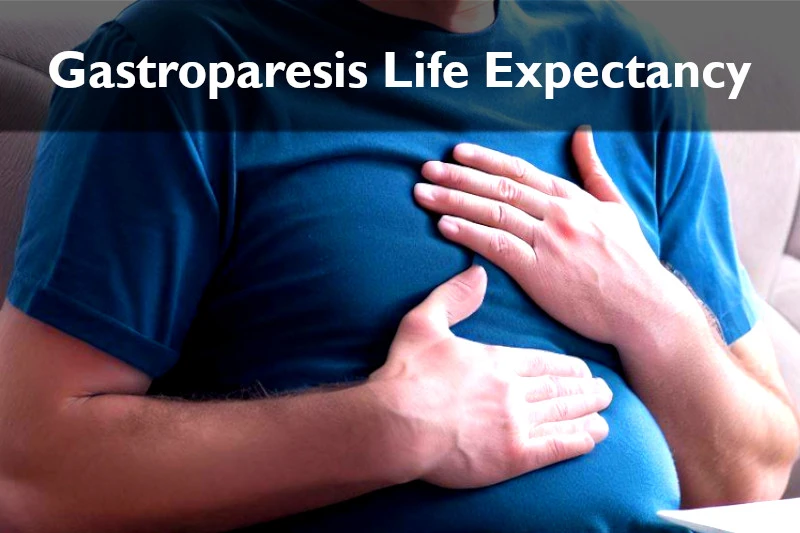Living with gastroparesis can present significant challenges and affect various aspects of daily life. From managing symptoms to adjusting dietary habits, individuals with gastroparesis navigate a unique set of circumstances. In addition to these difficulties, understanding gastroparesis life expectancy plays a crucial role in patients and their families with valuable information and a sense of empowerment.
Gastroparesis is a condition characterized by delayed emptying of the stomach, leading to an array of symptoms such as nausea, vomiting, bloating, and early satiety. This digestive disorder disrupts the normal movement of food through the gastrointestinal tract, resulting in challenges in nutrient absorption and proper digestion.
Individuals living with gastroparesis often experience limitations in their dietary choices and must carefully manage their eating patterns. Daily life may involve meticulous planning, constant monitoring of symptoms, and adapting to a slower digestive process. These adjustments can impact social activities, work commitments, and overall quality of life.
Gastroparesis life expectancy is a topic of great significance, as it helps patients and their loved ones gain a better understanding of the potential long-term outcomes associated with the condition. While gastroparesis itself is not typically life-threatening, it can contribute to complications that affect overall health and well-being.
By comprehending the factors that influence life expectancy in individuals with gastroparesis, individuals can make the right decisions about their treatment options, lifestyle modifications, and future planning. It enables patients to actively participate in their healthcare journey, work closely with healthcare professionals, and embrace strategies that enhance their overall prognosis.
Moreover, understanding gastroparesis life expectancy fosters a sense of support and encouragement within the gastroparesis community. It empowers individuals to connect with others who share similar experiences, exchange knowledge and coping strategies, and seek solace in knowing they are not alone on this challenging path.

In this blog post, we will discuss factors affecting gastroparesis life expectancy, explore various treatment approaches, and discuss strategies for improving quality of life. By addressing these aspects, we aim to provide a comprehensive resource that equips individuals with gastroparesis and their families with the necessary knowledge and tools to navigate their journey effectively.
Table of Contents
Understanding Gastroparesis
Gastroparesis is a complex digestive disorder that affects the normal movement of food through the stomach. Let’s try to understand in detail what gastroparesis is, its causes, the symptoms and complications associated with it, and the impact it can have on life expectancy.
Gastroparesis and its Causes
Gastroparesis, derived from the Greek words “gastro” meaning stomach, and “paresis” meaning partial paralysis, refers to a condition characterized by delayed gastric emptying. In individuals with gastroparesis, the stomach muscles fail to contract properly, impeding the efficient movement of food into the small intestine.
Causes
The causes of gastroparesis can vary and may include:
- Diabetes: One of the leading causes of gastroparesis is diabetes, specifically type 1 diabetes. Elevated blood sugar levels can damage the nerves that control stomach contractions.
- Post-surgical complications: Certain abdominal surgeries can result in damage to the vagus nerve, which regulates stomach muscle contractions.
- Neurological conditions: Conditions such as Parkinson’s disease and multiple sclerosis can affect the nerves responsible for gastric motility.
- Medications: Some medications, such as opioids and certain antidepressants, may contribute to delayed stomach emptying.
Symptoms and Complications Associated with Gastroparesis
Gastroparesis manifests through a range of distressing symptoms, which may include:
- Nausea and vomiting: Individuals with gastroparesis often experience persistent nausea and may vomit undigested food hours after eating.
- Bloating and abdominal discomfort: The delayed movement of food can lead to bloating, abdominal pain, and a feeling of fullness.
- Poor appetite and weight loss: Gastroparesis can diminish appetite, making it challenging to consume adequate nutrients, resulting in unintentional weight loss.
- Fluctuating blood sugar levels: Gastroparesis can make it difficult to predict the absorption of nutrients, leading to unpredictable blood sugar fluctuations in individuals with diabetes.
- Heartburn: Burning feeling in the mid-chest, behind your breastbone, rising from the lower tip of your breastbone toward your throat. This heartburn is caused by refluxed stomach acid that touches the lining of your esophagus.
Complications of gastroparesis can include malnutrition, dehydration, electrolyte imbalances, and an increased risk of bacterial overgrowth in the digestive system. Managing these complications is crucial for maintaining overall health and preventing further deterioration.
Impact of Gastroparesis on Life Expectancy
While gastroparesis itself is not typically life-threatening, its impact on life expectancy can be attributed to various factors. Gastroparesis can increase the risk of complications such as severe malnutrition, aspiration pneumonia (caused by inhaling stomach contents), and worsening glycemic control in individuals with diabetes.
It’s important to note that the impact on life expectancy varies depending on the underlying causes, severity of symptoms, and the presence of other comorbidities. Close collaboration with healthcare professionals, adherence to recommended treatment plans, and proper symptom management can help mitigate these risks and improve overall prognosis.
Gastroparesis Severity Classification
Here are broadly classified gastroparesis stages and severity:
- Mild gastroparesis: Symptoms relatively easily controlled. Able to maintain weight and nutrition on a regular diet or with minor dietary modifications.
- Compensated gastroparesis: Moderate symptoms with partial control with pharmacological agents. Able to maintain nutrition with dietary and lifestyle adjustments. Rare hospital admissions.
- Severe gastroparesis: Refractory symptoms despite medical therapy. Inability to maintain nutrition via the oral route. Frequent emergency room visits or hospitalizations.
Factors Affecting Gastroparesis Life Expectancy
Several variables come into play when considering the life expectancy of individuals living with gastroparesis. Understanding these factors is essential for individuals, their families, and healthcare professionals to develop an accurate prognosis and tailor treatment plans accordingly. Here are the variables that can influence gastroparesis life expectancy and their significance:
- Underlying causes: The specific cause of gastroparesis can play a role in life expectancy. For instance, individuals with diabetic gastroparesis may have a higher risk of complications related to diabetes, which can impact the overall prognosis.
- Disease progression: The severity and progression of gastroparesis symptoms can affect life expectancy. Chronic and poorly managed gastroparesis may lead to more significant complications and adverse outcomes.
- Treatment adherence: Consistent adherence to treatment plans and lifestyle modifications can positively impact life expectancy by managing gastroparesis symptoms, preventing complications, and optimizing overall health.
- Comorbidities: The presence of other medical conditions alongside gastropareses, such as diabetes, cardiovascular disease, or respiratory disorders, can complicate the management and prognosis of the condition.
The severity of gastroparesis symptoms can have implications for life expectancy. Individuals with milder symptoms and well-managed gastroparesis are generally at a lower risk of complications and may experience a better long-term prognosis.
On the other hand, individuals with severe symptoms, frequent hospitalizations, and nutritional deficiencies may face a higher risk of complications that can impact life expectancy.
Proactive management of gastroparesis, close monitoring of symptoms, and early intervention can help prevent or minimize complications, potentially improving life expectancy and overall quality of life.
Treatment Approaches for Gastroparesis
When it comes to managing gastroparesis and improving both quality of life and long-term outcomes, a variety of treatment options are available. From lifestyle modifications and dietary changes to medications and surgical interventions, let’s explore the different approaches for treating gastroparesis.
The treatment of gastroparesis aims to alleviate symptoms, improve gastric motility, and prevent complications.
Treatment of Option of Gastroparesis
The following treatment options may be considered:
- Lifestyle modifications: Making certain lifestyle adjustments can help manage symptoms and promote better digestion. These may include eating smaller, more frequent meals; chewing food thoroughly; avoiding fatty and high-fiber foods; and staying upright after meals to aid digestion. Further, stress can exacerbate symptoms, so implementing stress-management techniques such as meditation, deep breathing exercises, or engaging in relaxing activities can be beneficial.
- Dietary changes: Adapting the gastroparesis diet to accommodate the slower gastric emptying associated with gastroparesis is crucial. This may involve consuming easily digestible foods, pureeing or blending meals, and avoiding foods that exacerbate symptoms, such as carbonated beverages or high-fat foods.
- Medications: Medications are often prescribed to improve gastric motility and alleviate symptoms. Prokinetics, such as metoclopramide or domperidone, help stimulate stomach contractions and enhance emptying. Antiemetics, such as ondansetron, may be prescribed to manage nausea and vomiting.
- Surgical interventions: In severe cases of gastroparesis that are unresponsive to other treatments, surgical interventions may be considered. These can include gastric electrical stimulation, where a device is implanted to stimulate stomach contractions, or pyloroplasty, which involves widening the opening between the stomach and the small intestine.
It’s important to note that the choice of treatment approach should be made in consultation with a healthcare professional who can assess the specific needs and circumstances of each individual. Treatment plans should be personalized to address the severity of symptoms, underlying causes, and the presence of any comorbidities.
Additionally, it is essential for individuals with gastroparesis to actively engage in self-care and self-management. This includes diligently following the prescribed treatment plan, attending regular medical check-ups, and monitoring symptoms closely. Open communication with healthcare providers is vital to address any concerns or changes in symptoms promptly.
While treatment approaches for gastroparesis aim to improve symptoms and enhance overall well-being, it’s important to recognize that the condition may require ongoing management. Regular follow-up appointments and adjustments to the treatment plan may be necessary to ensure optimal control and minimize the risk of complications.
Improving Quality of Life
Living with gastroparesis can present various challenges, but there are strategies and lifestyle adjustments that can help individuals cope with the condition and improve their overall well-being. By implementing these tips and seeking the necessary support, individuals with gastroparesis can enhance their quality of life.
Strategies for coping with gastroparesis
- Acceptance and education: Accepting the diagnosis of gastroparesis and educating oneself about the condition are important first steps. Understanding the nature of gastroparesis, its symptoms, and its impact on daily life can help individuals adapt and develop effective coping strategies.
- Mental and emotional well-being: Managing the emotional aspects of living with gastroparesis is crucial. Seeking support from friends, family, or support groups can provide a valuable outlet for sharing experiences, receiving empathy, and gaining practical advice. Additionally, engaging in activities that promote relaxation and stress reduction, such as meditation, yoga, or journaling, can help improve overall mental well-being.
- Adjusting expectations: It’s important to recognize and accept that living with gastroparesis may require adjustments to one’s lifestyle and daily routines. Setting realistic expectations and learning to prioritize self-care can help individuals manage their energy levels and avoid unnecessary stress.
Managing symptoms and maintaining a healthy lifestyle
- Dietary modifications: Work closely with a registered dietitian or nutritionist to develop a personalized meal plan that accommodates the challenges posed by gastroparesis. This may involve a diet consuming smaller, more frequent meals, incorporating easily digestible foods, and avoiding trigger foods that exacerbate symptoms. It is ideal to maintain a diet handout to track what you eat and monitor how you perform.
- Hydration and nutrition: Ensuring adequate hydration and proper nutrition is essential. If solid foods are difficult to tolerate, liquid meal replacements or nutritional supplements may be recommended. It’s important to consult a healthcare professional to determine the most suitable options.
- Symptom management techniques: Various techniques can help manage specific symptoms associated with gastroparesis. These may include staying upright after meals to aid digestion, practicing relaxation techniques to reduce nausea or stress-related symptoms, and avoiding smoking or excessive alcohol consumption, which can worsen symptoms.
- Physical activity: Engaging in regular physical activity, as advised by a healthcare professional, can have multiple benefits. Exercise can help promote healthy digestion, maintain muscle tone, reduce stress, and improve overall well-being. However, it’s crucial to work with a healthcare provider to determine the appropriate level of exercise based on individual capabilities and limitations.
Seeking medical guidance and support networks

- Consultation with healthcare professionals: Regular communication with healthcare providers is crucial for managing gastroparesis effectively. They can help adjust treatment plans, provide guidance on symptom management, and monitor any potential complications. Seeking medical guidance ensures that individual needs are met and that the most appropriate treatment options are considered.
- Support networks: Joining support groups or connecting with others who have gastroparesis can provide a valuable sense of community and emotional support. Sharing experiences, exchanging tips and coping strategies, and receiving encouragement from others facing similar challenges can be empowering.
Remember, everyone’s experience with gastroparesis is unique, and it may take time to find the strategies, home remedies, and treatments that work best for each individual. By being proactive in seeking support, adapting lifestyle habits, and collaborating with healthcare professionals, individuals can improve their quality of life and manage gastroparesis more effectively.
Misconceptions Surrounding Gastroparesis Life Expectancy
Living with gastroparesis can be challenging, and there are several misconceptions surrounding the life expectancy of individuals with this condition. Let’s debunk some common myths and provide clarity on the topic.
- Myth: Gastroparesis drastically reduces life expectancy. Fact: While gastroparesis can impact daily life and require long-term management, it does not necessarily reduce life expectancy for all individuals. With appropriate treatment, lifestyle modifications, and regular medical care, many individuals with gastroparesis can lead fulfilling lives.
- Myth: Gastroparesis always leads to severe complications and shortened lifespan. Fact: Although gastroparesis can lead to complications such as malnutrition and dehydration, the severity and progression of the condition vary among individuals. Proactive management, including dietary changes, medications, and close monitoring, can help mitigate complications and maintain overall health.
- Myth: There is no hope for improving life expectancy with gastroparesis. Fact: While gastroparesis is a chronic condition, ongoing research and advancements in treatment provide hope for improved outcomes. By working closely with healthcare professionals, staying informed about new developments, and actively participating in their own care, individuals with gastroparesis can strive for a better quality of life and potentially extended life expectancy.
- Myth: Treatment options for gastroparesis are limited, affecting life expectancy. Fact: While gastroparesis treatment can be challenging, there are various approaches available. Lifestyle modifications, dietary changes, medications, and, surgical interventions in severe gastroparesis can help manage symptoms and improve gastric motility. A personalized treatment plan, tailored to an individual’s specific needs, can significantly impact their overall well-being and potentially prolong life expectancy.
- Myth: Gastroparesis always progresses and shortens life expectancy over time. Fact: Gastroparesis progression differs among individuals. Some may experience stable symptoms with proper management, while others may have more variable outcomes. Regular communication with healthcare providers, adherence to treatment plans, and proactive symptom management can help minimize disease progression and optimize quality of life.
It’s important to remember that each individual’s experience with gastroparesis is unique. Factors such as underlying causes, comorbidities, and treatment adherence can significantly impact outcomes. Seeking accurate information, maintaining open communication with healthcare professionals, and connecting with support networks can provide valuable guidance and alleviate unnecessary anxiety or misconceptions surrounding gastroparesis life expectancy.
Takeaway
Living with gastroparesis can present unique challenges, but with the right knowledge, support, and treatment approaches, individuals can effectively manage the condition and strive for an improved quality of life. Let’s recap the key points discussed in this blog post:
- Understanding Gastroparesis: Gastroparesis is a condition characterized by delayed stomach emptying, leading to symptoms such as nausea, bloating, and abdominal pain. It can impact daily life and require lifestyle modifications and medical interventions.
- Factors Affecting Gastroparesis Life Expectancy: Several variables can influence gastroparesis life expectancy including disease severity, underlying conditions, and comorbidities in gastroparesis patients. Working closely with healthcare professionals is crucial in managing these factors effectively.
- Treatment Approaches for Gastroparesis: Treatment options for gastroparesis include lifestyle modifications, dietary changes, medications, and surgical interventions. Customized treatment plans, tailored to individual needs, can help alleviate symptoms and improve overall well-being.
- Improving Quality of Life: Coping strategies, symptom management techniques, and mental and emotional well-being play a vital role in enhancing the quality of life for individuals with gastroparesis. Seeking support from healthcare providers and connecting with support networks can provide valuable guidance and encouragement.
- Misconceptions Surrounding Gastroparesis Life Expectancy: Misconceptions can lead to unnecessary worry and anxiety. It’s crucial to debunk these myths and provide clarity. By seeking accurate information and support, individuals can better navigate their gastroparesis journey and alleviate misconceptions about life expectancy
To all individuals living with gastroparesis, it’s important to remember that you are not alone. There is a supportive community ready to offer encouragement, understanding, and practical advice. While gastroparesis may present challenges, it does not define you. With the right support network, self-care practices, and treatment strategies, you can lead a fulfilling life despite the condition.
FAQ
Does gastroparesis affect life expectancy?
Gastroparesis, a condition where the stomach takes longer to empty its contents, can significantly impact one’s quality of life. While it can cause complications and discomfort, it typically does not directly affect life expectancy.
However, managing gastroparesis and its underlying causes is crucial to prevent further health complications and maintain a healthy lifestyle. Regular medical care, dietary modifications, medication, and lifestyle adjustments can help individuals with gastroparesis lead fulfilling lives.
It’s essential to consult with a healthcare professional for personalized advice and guidance.
What are the severity stages of gastroparesis?
The gastroparesis severity stages are broadly classified into:
Gastroparesis severity stages are often classified based on the symptoms and their impact on daily life. While different systems exist, one commonly used classification includes mild, moderate, and severe stages.
Mild stage: Symptoms may be intermittent and manageable with dietary changes and medications.
Moderate or Compensated: This stage involves more frequent and pronounced symptoms that may require additional treatments and dietary restrictions.
Severe stage: Symptoms are persistent and significantly affect daily life, often requiring more aggressive treatments such as specialized diets, medications, and sometimes even surgical interventions.
Does gastroparesis get worse with age?
The progression of gastroparesis can vary from person to person, and while age can be a factor, it doesn’t necessarily mean that gastroparesis will worsen with age for everyone.
In some cases, gastroparesis symptoms may remain stable or even improve over time. However, for certain individuals, the condition may progress and lead to more severe symptoms as they age.
It’s important to work closely with healthcare professionals to manage symptoms and address any potential changes or complications that may arise with age. Regular medical care, lifestyle adjustments, and appropriate treatment strategies can help minimize the impact of gastroparesis on daily life, regardless of age.
Can gastroparesis go away on its own
Gastroparesis typically does not go away on its own. It is a chronic condition that requires ongoing management and treatment. While symptoms may fluctuate and improve for some individuals, the underlying causes of gastroparesis usually persist.
With proper medical care, dietary modifications, medication, and lifestyle adjustments, it is possible to alleviate symptoms and improve quality of life. However, it’s important to work closely with healthcare professionals to develop a personalized treatment plan and manage gastroparesis effectively.
3 Sources:
Noble Home Remedies relies on peer-reviewed studies, academic research institutions, and medical associations for accuracy and reliability while avoiding tertiary references. Our editorial policy provides more information about how we ensure our content is accurate and up-to-date.
- What is gastroparesis? by Drugwatch
- Delayed gastric emptying as an independent predictor of mortality in gastroparesis by Wiley online library
- Nutrition therapy tips to help manage gastroparesis by American Gastroenterological Association






